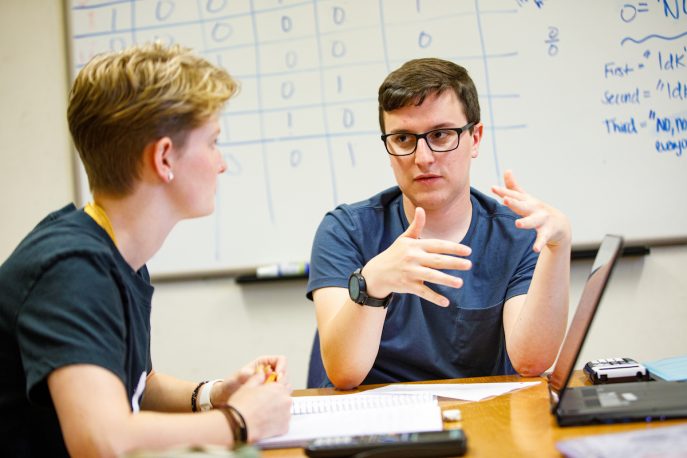Mathematics/Economics Interdepartmental Major
Throughout history, mathematics has helped to improve the human condition. Economics, meanwhile, has explored how resources are conserved, spent, allocated. Using numbers and data as problem-solving tools to impact people and policies provides ample opportunity for the two disciplines to come together in a single academic program.

Why Study Mathematics/Economics at Albion?
If economics is your primary interest, you’ll be able to learn the mathematical approach to this discipline. Or perhaps you lean a little more toward the math side of the equation—you’ll be able to learn the importance of mathematics as a theoretical and empirical tool for solving economic and business problems. From either angle, you’ll pursue a unique program of study in state-of-the-art facilities alongside distinguished faculty.
What Will You Learn as a Mathematics/Economics Major?
The major is intended for those students who wish to combine these two areas of study but do not want to limit their course work in other liberal arts areas by having to take all of the classes necessary for completion of the two majors.
Following foundational courses in micro- and macroeconomics, you’ll add calculus to the mix to make for a more rigorous exploration of intermediate-level microeconomics. Later you will tackle differential equations that carry distinct economic implications, and be introduced to empirical work, optimization and economic analysis, game theory and financial economics.
Program Highlights
Student Activities

As a mathematics/economics major, you’ll join a vibrant community of scholars who learn and connect outside the classroom as well. Ask questions at the Mathematics and Computer Science Colloquium Series; participate in the Investment Club to manage a real financial portfolio; or join the mathematics honorary society Kappa Mu Epsilon, which offers opportunities for professional networking.
Off-Campus Opportunities

Gain real-world experience and explore potential careers through off-campus internships. In recent years, our students have interned for Goldman Sachs; NorthPointe Capital; Ernst & Young; Baird Investment Bank; PricewaterhouseCoopers; Quicken Loans; Pfizer; and Heitman Real Estate Investment.
Numerous research opportunities are available to Albion mathematics/economics students as well—at academic institutions, federal government agencies and government scientific laboratories.
Careers & Outcomes
Students completing the major in mathematics/economics will be well prepared to enter a career in business consulting or to enroll in graduate programs in economics, operations research or applied mathematics. Many attend MBA programs. Demand is high in both industry and government for employees with training in mathematics and economics.
Job Titles
- Business Consultant
- Corporate Executive
- Economic Researcher
- Financial Advisor
- Financial Risk Analyst
- Investment Analyst
- Lawyer
- Mathematician
- Statistician


